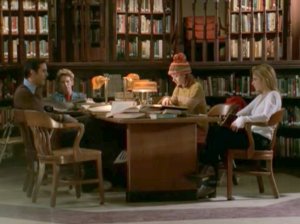 Buffy and her friends spend a lot of time reading. This is uncharacteristic enough for a Hollywood prime-time serial drama (it’s practically un-American). But more specifically, they spend a lot of time doing research: finding the most authoritative sources on a subject, reading up, and discussing what they read. And it’s rare that the research doesn’t pay off, in one way or another; most often, it pays off in critical discoveries and insights, knowledge of the situations, events, and adversaries they face, of the histories that have produced them, and sometimes even of vital knowledge of self. That knowledge reliably then helps Buffy to kick serious demonic ass. Buffy the Vampire Slayer routinely dramatizes research in action as a public good.
Buffy and her friends spend a lot of time reading. This is uncharacteristic enough for a Hollywood prime-time serial drama (it’s practically un-American). But more specifically, they spend a lot of time doing research: finding the most authoritative sources on a subject, reading up, and discussing what they read. And it’s rare that the research doesn’t pay off, in one way or another; most often, it pays off in critical discoveries and insights, knowledge of the situations, events, and adversaries they face, of the histories that have produced them, and sometimes even of vital knowledge of self. That knowledge reliably then helps Buffy to kick serious demonic ass. Buffy the Vampire Slayer routinely dramatizes research in action as a public good.
One of the main protagonists, the “watcher” Giles – Buffy’s supervisor and paternal sort of mentor – is a librarian, who runs the high school library. For all the predictable tweedy jokes, the character is an essential part of the team, as readily looked to as leader as the slayer herself. Giles demonstrates research best practices by cultivating an important specialist collection (although its place in a public secondary school is curious, and sometimes challenged by parents and other authority characters), by identifying the best sources on certain subjects, and by putting in the time and effort that research needs to take if it is to prove valuable.
In an early, character-establishing first-season episode, Buffy’s friend Willow asks Giles:
–How is it you always know this stuff? You always know whats going on. I never know whats going on.
–You werent here from midnight till six researching it.
This is a teachable moment: in subsequent episodes, the whole team is often shown in marathon, wee-hours research tableaus and montages. Here are still frames from one such typical montage, in season three’s episode 10 (“Amends”).
For the first three seasons, then, the school library is a regular setting for scenes in the series, scenes of research, and of modeling how to do research. The library setting also thus comments on the anti-intellectual ideology that’s more common and prevalent in popular culture. Except for the main protagonists, the school library is usually deserted. When student character extras enter, the protagonists meet them with surprise and bewilderment. That the library has an extensive specialized collection of rare and ancient texts on withcraft and demonology goes largely unnoticed by other characters, except in one third-season episode (“Gingerbread’) in which Buffy’s mother spearheads a moral panic and literal witch hunt, leading to the police confiscation of Giles’ specialist archive, and culminating in a witch- and book-burning denouement.
The series script regularly has characters recognizing a need for and then conducting research, often in montage scenes to suggest the significant time and effort that goes into the research process. There are plenty of jokes about how research is tiring, isn’t fun, and so on, but the protagonists still commit to it – and it usually brings results. Their research regularly results in knowledge that helps and often saves individuals, groups, the town, the world. The series reinforces its valuation of research too by dramatizing inattention and lack of rigour as research practice errors that make bad situations worse. For instance, in the third-season episode in which an imported face mask begins producing zombies, an early scene shows Giles absentmindedly turning pages in a book, ostensibly researching, but flipping past the page that illustrates and describes the mask. The show makes it imperative not only that one does one’s homework, but that one does it well: using the best sources and reading them diligently.
As the series progresses, the fact that Buffy and her team graduate from high school and go to college doesn’t change their need to do research, but changes the dramatic sites in which research is done. Interestingly, in the fourth season, as Buffy and Willow begin college, the first episode briefly shows the college library as a serious research library that dwarfs the school’s; however, the protagonists are never shown doing research there. That they refrain from researching in the university library suggests that library – unlike the school’s – does actually get used by other students, and doesn’t house the specialized archive they need. So instead, the library moves, becomes portable – and, interestingly, more privatized. In the fourth season, most of the research is done at Giles’ own home.
In the fifth season, when he buys the town magic shop, this retail store becomes the repository for Giles’ collection and the primary site in which the team carries out its researches.
The series thus both promotes the value of research as a public good, and – ironically if not downright paradoxically – performs the privatization of research resources, in the migration of the team’s library from the high school, to the librarian’s home, to a retail store. Buffy the Vampire rewards rewatching today with a critical eye to its representations of research, given significant developments in research and its regulation. At the global level, the various policies and trade deals that purport to strengthen copyright law, taken together, represent a multilateral, globalized campaign not only to protect Big Content businesses but even to control the Internet, to regulate and curb its demonstrated potential to subvert modern forms of state governance. At the regional level, the overdeveloped Anglophone world (e.g. the USA, the UK, Canada) privileges private corporate interests whose client governments are carrying out a systematic program of what political science professor Janine Brodie calls “manufactured ignorance”: the active destruction – through “austerity” and other policy measures – of citizens’ “social literacy,” that is, a people’s knowledge of self and history as a people. Canada, for example, has recently witnessed deep budget cuts to libraries, archives, and public broadcasting, as well as the active government muzzling of climate change researchers.  To retrieve, today, a popular cultural product, from the not-so-distant past, that prominently promotes research as the first step of effective social action – a vital contribution to the public good – is a most welcome research result. It’s a lesson in history, as conceptualized by Walter Benjamin: history is the critical image that flashes before you at a moment of danger. And so, I might add, is research.
To retrieve, today, a popular cultural product, from the not-so-distant past, that prominently promotes research as the first step of effective social action – a vital contribution to the public good – is a most welcome research result. It’s a lesson in history, as conceptualized by Walter Benjamin: history is the critical image that flashes before you at a moment of danger. And so, I might add, is research.
Works Cited
Buffy the Vampire Slayer. Writ. Joss Whedon. Warner Bros./Paramount, 1997-2003.
Brodie, Janine. “Manufacturing ignorance: Harper, the census, social inequality.” Canada Watch Spring 2011. 30-31. http://robarts.info.yorku.ca/files/2012/03/CW_Spring2011.pdf
—. “On courage, social justice, and policymaking.” Rabble.ca 16 Sept. 2012. http://rabble.ca/news/2011/09/courage-social-justice-and-policy-making
Screen frames from Buffy the Vampire Slayer used under fair dealing provisions of Canadian copyright law.

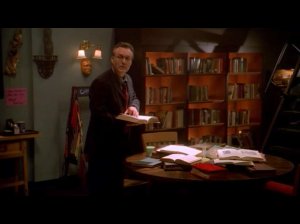

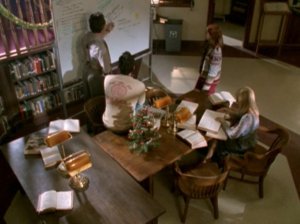

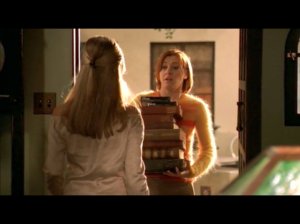
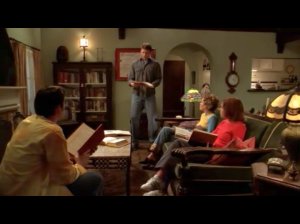
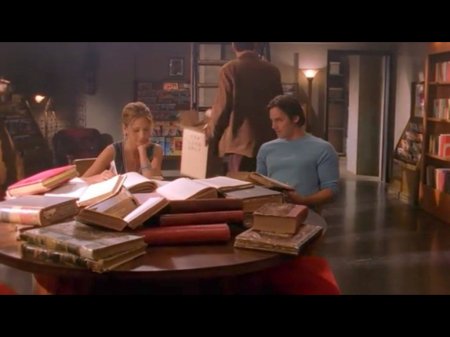
I wrote about Giles for American Libraries some years ago, and the article has been reprinted since. It is on the web here
http://www.well.com/~ladyhawk/giles.html
Thanks for sharing your article. I have yet to tackle the substantial research literature on Buffy (ironically), but I’m not surprised to find some of my ideas anticipated in your article; I know I’m arriving pretty late to the party here. Your argument encompasses an important aspect of the librarian’s characterization: his conflicted relationship to new media. The conflict between print and digital dramatized in the series (especially earlier on) remains highly relevant, amidst the ongoing copyfight and the emerging Open Access movement.
You were making interesting and making a valid point until you took a ridiculous left turn into copyright paranoia.
During the time BUFFY was on, I was doing serious research into arcania and occult materials for a novel I was writing. The Internet really wasn’t of use back then, and the only printed and in copyright material available was pop culture nonsense that would have gotten Buffy and the Scooby Gang seriously dead because of inaccuracies.
Private collections were really the only way to go beyond the surface level material so BUFFY was being accurate.
These days, the Internet is available, for better or nonsense, but many libraries are creating digital archives of their collections, including arcania, that can be seen online. Since none of these books are in copyright, there’s no need for left turn paranoia about the copyright police.
While I do think that paranoia is actually an optimal way to approach copyright issues today, my point here is just that Buffy dramatizes positive images and uses of research in a way that becomes freshly relevant today, when the value of and opportunities for research are actively attacked and endangered – by public officials (didn’t Sarah Palin encourage Americans to “stand up to experts”?), by government-ordered budget cuts to research resources and services, and – if not intentionally than still effectively – by legislation and trade deals that are ostensibly “just” about copyright but harbour huge implications for all kinds of knowledge and culture resources and media. SOPA was one especially dramatic example of legislation on copyright that would have impacted much more: the Internet as a whole.
I have included some links in my post’s last paragraph to detail some of the research-curbing developments and decisions that the paragraph briefly alludes to.
I appreciate your observations on the tension between print and digital research resources in the series itself, and, seeing this as cause for others’ comment too, I’m curious to read more on this matter. The first-season episode “I robot, you Jane” remarkably dramatizes issues that were in the mid-1990s just starting to emerge in the book business…issues that still remain with us, well over a decade later.
Pingback: The Great Geek Manual » Geek Media Round-Up: October 3, 2012
Pingback: Around the Web: Becoming Internet famous, Why some academics publish more and, er, more – Confessions of a Science Librarian
Pingback: Geek Media Round-Up: October 4, 2012 – Grasping for the Wind
Pingback: World’s Strangest | At the Libraries: Rowling Breaks Records
Pingback: Happy Poetry Day! « So Many Books
I had always hoped that “Buffy” would inspire more young people that even “cool” people (not in the quarterback or cheerleader sense but in the “kick butt” one) do their homework. But I had always wondered: why was there seemingly less on “Angel”? Although the show did not occur in an academic setting, there would still seemingly be research that needed to be done.
Thanks for your question, Sam. I must admit I haven’t watched Angel, so I will have to defer to those who have, to answer. The contrast, as you describe it, does seem stark.
I also want to mention here my thanks for everyone’s responses to this post. I’ve been amazed by the response, both in terms of quantity and quality. I’ve created a Storify page to document the distributed online conversation this post has prompted, and to develop questions arising from it, amidst evidence of a widely shared sense that research is of paramount public importance – but is also perhaps in crisis.
http://storify.com/sonicfiction/buffy-resonates-with-researchers-around-the-world
Maybe you can weigh in after you’ve watched Angel, but I wonder if the show’s downplaying of research might have something to do with it’s aim to present a more “gritty,” “working class” image? For the first four seasons, anyway, Angel & friends operate a small, cash-strapped detective agency, deal (superficially, at least) with some of the issues related to living in poverty, spend time with criminals in a seedy karaoke lounge, and interact with L.A.’s poor and racialized neighbourhoods. Private rare book collections and, more generally, access to education don’t quite fit in. (There is a plot arc in the fifth season to do with one character’s access to education, but I think you mentioned something about “no spoilers”…)
(Potential Angel spoilers?) When Wesley came to Angel as its resident Watcher, the research angle moved up a small notch. While Angel was himself supernatural and understood that realm intimately, Wesley was able to dive into research from a human perspective. Unfortunately, since he wasn’t in an academic setting, his resources were seriously limited.
In later season, when Angel & co moved to Wolfram & Hart, Wesley’s library, along with Fred’s scientific research, became pretty well established. It was a geek paradise. 🙂
On a personal level, I found Wesley’s struggle to do research without having an academic affiliation very poignant. I’ve found myself using my husband’s ALADIN log-in more than once…
Pingback: Huki-Links: October 9, 2012 | Hawaii Book Blog
I agree with everything you say about the positive value given research in BTVS (including the students’ attitude of “It’s boring, but we’ve got to do it”).
However, there are a couple of glitches in the show about how it does this. First, if the students say that they’ve looked, but there’s nothing on a given topic, Giles’ response is usually “Well, just find out whatever you can,” without even an implication of “You missed it when you turned the page” as Giles himself did once. Semi-believing you can force answers out of an inadequate data source is a fault even librarians fall into. (Many years ago I was among a group of librarians attending a demonstration session for a pilot relevance-ranking algorithm program. The researcher had used his library school’s book catalog as a test database, but the audience kept suggesting searches for topics that wouldn’t be in a library school library, perhaps under some magical thinking that the computer could somehow make them turn up. This was, as should have been obvious, not a good way to demonstrate what the program could do.)
Second is the failure to note that research would be a lot faster and easier if the books were indexed, or better yet online. (There is some discussion early on about scanning them, but that’s derailed after a demonic book comes to life inside the computer on being scanned, not – I hope – much of a real-life problem.)
And re your so-called “copyright paranoia” – it’s not paranoia if they’re really out to get you.
Pingback: LIBR 200 – Introduction | Learn all the things!
Pingback: Building a Vampire Library | The Vampirologist
Reblogged this on DVD Commentary and commented:
This Buffy-centric post by Professor Mark McCutcheon, which I originally found on his blog, Academicalism, is definitely worth a read. It’s a very accessible article that is an enjoyable read, makes some good points about the show, provides a good example of how to break down and analyze a seven-season show, and could be a welcome distraction if you’re trapped in a library prepping for midterms. Thanks for letting me reblog it, professor!
Pingback: Obsessed with Buffy, much? – Wellcome Collection Blog